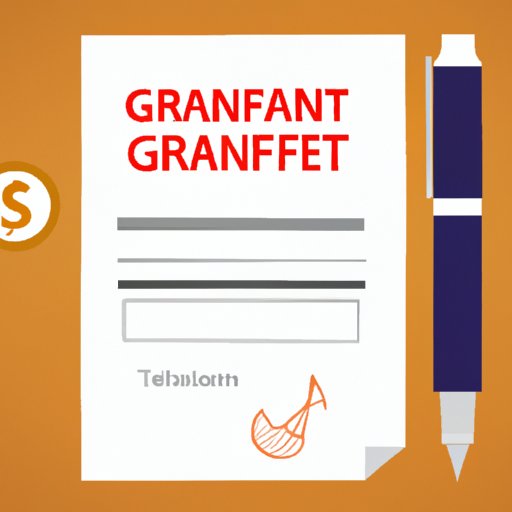I. Introduction
Grants are vital sources of funding for individuals and firms in various industries. They provide monetary support to initiatives and projects with the potential to bring about positive change in the community. However, applying for a grant can be challenging, time-consuming, and highly competitive. This article offers a comprehensive guide for those eager to learn how to apply for a grant successfully.
II. Step-by-Step Guide
The grant application process can be broken down into several stages. Each stage requires different requirements and documents, making it crucial to understand the details of each step:
- Identify grants that match your project or initiative. Research potential grantors and read their guidelines
- Gather necessary documents like proposals, budgets, and any legal documentation
- Write a compelling grant proposal. It should contain a clear project description, your goals, and how the grant will help achieve them
- Submit your application before the deadline
One essential tip while writing a grant proposal is to make it clear, concise, and persuasive, highlighting the project’s significance and the potential impact on the community. Avoid vague ideas and jargon in the proposal and instead focus on goals, objectives, and outcomes.
Common mistakes while applying for grants include missing the deadline, incomplete application, lack of understanding of requirements, and poorly written proposals. Ensure that you proofread and double-check your application before submitting it to avoid any careless errors.
III. Personal Experience
Success stories from individuals and businesses who secured grants can be inspirational and informative. Their unique journeys to grant success can provide insights into what worked and what did not work for them.
For instance, one firm might have successfully secured a grant by identifying which grantor aligned with their project. Another individual may have focused on the grant proposal’s clarity and specificity, highlighting the goals and outcomes. Other examples could include collaborations between teams, persistence through rejection, and excellent communication skills with the grantor.
IV. Practical Tips
For many, understanding grant eligibility and application deadlines is crucial when applying for a grant. Before applying, research and understand the eligibility requirements concerning the grantor’s goals and missions.
When developing a compelling grant proposal, ensure that your project aligns with the grantor’s objectives and mission statements. If possible, try and align your proposal with the grantor’s priorities and preferences.
Focus on highlighting the goals and outcomes of your project rather than the budget. Be clear in your proposal by using concise language. Utilize infographics or charts to illustrate your project’s significance, goals, outcomes, and budget.
V. Expert Advice
Grant experts offer valuable insights and advice from the grantor’s perspective, which is ideal for understanding what grant-giving organizations look for when considering grant applications.
Some best practices in developing successful grant proposals include being unique and innovative while aiming to solve real-world problems. Grantors look for passionate and committed individuals and firms who have a strong track record of success.
There are several grant opportunities available, from government grants for research and development or social initiatives to private grants for creative projects or nonprofits. Knowing the different types of grants, eligibility, and deadlines will provide an advantage when applying for a grant.
VI. Success Stories
Successful grant recipients can offer insight into what benefits grants offer, from monetary support to help bring their project to fruition to valuable networking opportunities.
One individual may have received monetary support, which enabled research to be conducted, while another received recognition for an innovative solution that can profoundly impact society.
VII. Video or Webinar
For a more interactive and visual guide, one can find webinars or videos that cover the grant application process. These resources offer expert tips and examples that can give a clearer understanding of what funders look for when evaluating proposals.
VIII. Conclusion
In conclusion, understanding the grant application process is crucial to a successful grant application. This article provides expert and practical advice on how to develop a compelling and detailed grant proposal, increasing your chances of receiving funding. We urge our readers to go forth and apply for grants, and we welcome any feedback to enhance this article.
(Note: Is this article not meeting your expectations? Do you have knowledge or insights to share? Unlock new opportunities and expand your reach by joining our authors team. Click Registration to join us and share your expertise with our readers.)
